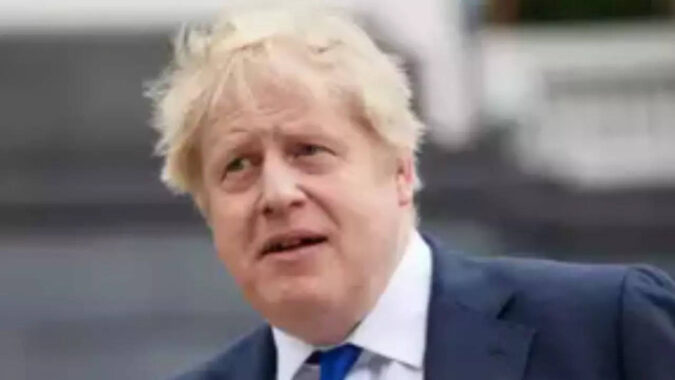LONDON – Britain’s former Prime Minister Boris Johnson abruptly resigned his parliamentary seat on Friday, another dramatic twist in the career of one of the country’s most flamboyant and divisive politicians.
Johnson has been under investigation from a committee of the House of Commons that was looking into whether he had lied to Parliament over lockdown-breaking parties at Downing Street during the COVID-19 pandemic.
On Friday, having received a confidential copy of its findings, he accused the committee of attempting to drive him out, adding: “They have still not produced a shred of evidence that I knowingly or recklessly misled the Commons.”
The committee had the power to recommend a sanction that could have led to Johnson being forced to fight an election to hold his constituency just outside London – a contest he might well have lost.
Instead, the former prime minister preempted that prospect by quitting. His decision means that there will now be a by-election in the constituency, but one he says he will not contest.
Johnson had made little secret of his ambition to win back the job of prime minister, and holding a seat in Parliament is a prerequisite of doing so. But it remained unclear whether this was a permanent departure from the House of Commons for Johnson, who once before resigned a seat to become London mayor, then returned to represent a different constituency.
Johnson was forced out as prime minister last July, but he has continued to cast a shadow over British politics in the past year, putting himself at the center of disputes over his handling of the pandemic and the accounts he gave to Parliament about the parties held at Downing Street during lockdown.
While the contents of the committee’s report were not clear, Johnson’s decision suggested that it had recommended more than a 10-day suspension, which could trigger an automatic election for his seat.
Appearing before the parliamentary committee in March, he acknowledged that he had made misleading statements in Parliament when he assured lawmakers that there was no breach of lockdown rules. He said he took full responsibility for the Downing Street gatherings. “That was wrong, I bitterly regret it,” he said at the time.
In a statement on Friday, Johnson went further. “I am not alone in thinking that a witch hunt is underway to take revenge for Brexit and ultimately to reverse the 2016 referendum result,” he wrote. “My removal is the necessary first step, and I believe there has been a concerted attempt to bring it about.”
The unexpected announcement could signal the end of a career by a politician known for breaking rules and disregarding norms. But it could also be merely a twist in a career marked by frequent surges and setbacks.
Johnson has been under investigation from a committee of the House of Commons that was looking into whether he had lied to Parliament over lockdown-breaking parties at Downing Street during the COVID-19 pandemic.
On Friday, having received a confidential copy of its findings, he accused the committee of attempting to drive him out, adding: “They have still not produced a shred of evidence that I knowingly or recklessly misled the Commons.”
The committee had the power to recommend a sanction that could have led to Johnson being forced to fight an election to hold his constituency just outside London – a contest he might well have lost.
Instead, the former prime minister preempted that prospect by quitting. His decision means that there will now be a by-election in the constituency, but one he says he will not contest.
Johnson had made little secret of his ambition to win back the job of prime minister, and holding a seat in Parliament is a prerequisite of doing so. But it remained unclear whether this was a permanent departure from the House of Commons for Johnson, who once before resigned a seat to become London mayor, then returned to represent a different constituency.
Johnson was forced out as prime minister last July, but he has continued to cast a shadow over British politics in the past year, putting himself at the center of disputes over his handling of the pandemic and the accounts he gave to Parliament about the parties held at Downing Street during lockdown.
While the contents of the committee’s report were not clear, Johnson’s decision suggested that it had recommended more than a 10-day suspension, which could trigger an automatic election for his seat.
Appearing before the parliamentary committee in March, he acknowledged that he had made misleading statements in Parliament when he assured lawmakers that there was no breach of lockdown rules. He said he took full responsibility for the Downing Street gatherings. “That was wrong, I bitterly regret it,” he said at the time.
In a statement on Friday, Johnson went further. “I am not alone in thinking that a witch hunt is underway to take revenge for Brexit and ultimately to reverse the 2016 referendum result,” he wrote. “My removal is the necessary first step, and I believe there has been a concerted attempt to bring it about.”
The unexpected announcement could signal the end of a career by a politician known for breaking rules and disregarding norms. But it could also be merely a twist in a career marked by frequent surges and setbacks.
